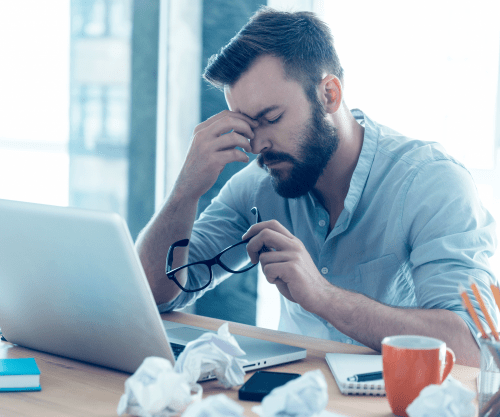
Do you struggle to get out of bed in the morning? Always feel like you need a nap come 3pm? Wish you had more energy? HFG nutritionist Claire Turnbull has the answers to feeling better.
Working in the field of nutrition, there are many things I talk to people about. But it is becoming increasingly common to hear people say they are struggling with feeling as if they are running on empty and wishing they had more energy.
It is not unusual to feel tired and run-down sometimes, particularly if you have a lot going on in your life, you are going through a stressful time or you have a new-born baby keeping you up all night! Ongoing extreme tiredness and fatigue, however, is neither normal nor healthy and needs investigation.
In some cases, having low energy can be the sign of an underlying medical condition which will need to be addressed (see What else could it be? below). If you have been feeling extremely tired for long periods without any good reason, it is definitely a good idea to head to your GP and check that you don’t have any underlying health problems.
For others, low energy levels can be directly related to what we are eating and drinking, how much good quality sleep we are getting (or not) and the amount of rest we get. When things get busy, it is all too easy to grab unhealthy food and drinks on the run, and it can be difficult to unwind and to find time to switch off — all of which can wreak havoc with our health and energy levels.
There is no shortage of quick-fix solutions if you are feeling a bit tired and need an energy boost. We are surrounded by energy drinks and sugary snacks, and a fourth or fifth coffee to help get through the afternoon is the norm for many people. The problem is, these quick fix solutions can end up being part of the problem, only fuelling the cycle of fatigue. It is best to look at the causes of low energy rather than just masking it by having another coffee.
Here are things to consider:
Is your diet varied enough?
It can be tempting to eat the same thing day in day out, but that may not be helping if you are fatigued and tired. Including a wide variety of foods is an excellent way to help make sure you are getting the nutrients, vitamins and minerals you need to help your body work at its best.
To make sure you are eating a variety of foods plan your meals and write a shopping list each week. You can then see in advance what you will be eating and you can check you are including different options.
What time do you eat?
There are a lot of theories about the ideal number of times to eat in a day… six times a day, every two hours, every four hours, don’t eat after 7pm or after 9pm…
The truth is, it is important to eat regularly but there isn’t a generic ‘one size fits all’ rule that works for everyone. It depends on what time we get up, what time we go to bed and when we do exercise.
What’s important is to get the timing right for you. For some people that may be three meals and two snacks. For others, four moderate-sized meals. Overall, the key is to get a healthy balance of foods over the day without relying on high-sugar, low-nutrient snacks and drinks.
If, for example, you are busy and active earlier on in the day and sedentary at night, you may find a good-sized breakfast and moderate-sized lunch and dinner works well for you. If you sit at a desk from nine to five and then exercise after work, you may find having a smaller breakfast and lunch works well and then having a decent-sized afternoon tea to help fuel an after-work workout is ideal. This is then followed up by a healthy dinner when you get home.
For those who exercise after work it is important to include carbohydrate for recovery as part of the evening meal. If you don’t, your body doesn’t recover properly from the training session which may lead to you feeling tired and low in energy. If you are regularly exercising at a high intensity, getting things right post-workout for recovery is vital.
How is your hydration?
Keeping well hydrated is really important to help your body work at its best and can make a big difference to how you feel. The amount you need to drink varies from person to person and it is also influenced by how much you sweat, whether you work outdoors or in an air-conditioned office, and the time of year.
Drinking two litres a day is a good guide but it may be you need more. Water is the best drink. I like to encourage people to check their urine as a guide to see how well hydrated — or not — they are during the day. The ideal is to be passing pale pee during the daytime.
Do you get outside enough?
Did you know that exposing your eyes to daylight helps regulate hormones which impact your mood and how well you sleep? It is important to get outside every day and expose your eyes to the light ie. without sunglasses on. Head out for an afternoon or evening walk when it’s not super-bright and allow your eyes to be exposed to the light. In my experience, the transformation in people’s energy levels when they do this is remarkable! Many of us spend far too much time inside — yet another reason to go for a walk before or after work if you can and get outside at the weekend.
Are you relying too much on caffeine and other stimulants?
Caffeine has a long half-life, meaning once you have had food or drink containing caffeine, it stays in your system for a long time. In fact, for the average person, roughly six hours after having caffeine there will still be half the amount of caffeine in your system as there was when you first had the drink. What this means is that when you go to bed, even if it has been hours since you had caffeine, there can still be some hanging around in your system. This won’t necessarily stop you from going to sleep but it can affect the quality of your sleep and prevent you from getting the deep sleep you need to feel rested and to recover adequately.
If caffeine is affecting your sleep, aim to have your caffeine in the earlier part of the day. This will allow most of the caffeine to be cleared from your system by the time you head to bed. It’s a vicious cycle — needing coffee/tea/stimulants to stay awake because you are tired then not sleeping well and so on. If you are really struggling with tiredness and fatigue yet still drink large amounts of tea, coffee and other caffeine/stimulant drinks, try weaning yourself off them over a couple of weeks and see how you feel.
How well are you sleeping?
With people who feel low in energy, one of the biggest issues I come across is inadequate and poor quality sleep. We all need sleep. It is our body’s time to take over, rest and recover. Most people need at least seven hours’ quality sleep each night, more when you are in your teenage years and growing, more for those who do a large amount of exercise. Reducing the amount of stimulant drinks you have, limiting alcohol before bed and finding a way to relax and stop your mind from racing before going to bed can be helpful. Good quality sleep is also helpful when it comes to maintaining a healthy weight.
What now?
There are lots of things that you can do to help beat tiredness and low energy — and this discussion is really just the tip of the iceberg. If you want to start making a change right now, begin with keeping a diary — record over a couple of weeks what you are eating/drinking, how much exercise you are doing, how much sleep and rest you are getting… and see if you are able to identify any areas you can work on. Don’t forget to head to your doctor if fatigue is a big issue for you, to make sure there are no other problems which need addressing.
What else could it be?
Other reasons for extreme tiredness:
Coeliac disease
This affects around one in 100 people. With coeliac disease, the gut is damaged by eating gluten and as a result, the body is unable to properly absorb many of the nutrients in food, iron being one example. If your body is unable to properly absorb the goodness from food, extreme tiredness may result.
Diabetes
Having high levels of glucose in your blood can cause extreme tiredness and is a common symptom of undiagnosed diabetes. To see if you are at risk, check out www.diabetes.org.nz.
Chronic fatigue syndrome (also called ME)
This is serious ongoing fatigue that affects everyday life and doesn’t go away with sleep or rest. The exact cause is unknown, but a history of viral infections, immune system issues and hormonal imbalances are some suggestions. Seek medical advice if this sounds like you.
Underactive thyroid
This means that your body isn’t making enough thyroid hormone and it can result in you feeling very tired. Some people will also gain weight with this issue, too.
Depression and anxiety
These can also affect how you feel and how much energy you have.
Are you falling short on any vital nutrients?
If you are feeling very tired, head to your GP to check you don’t have any underlying medical issue and if appropriate, they may consider doing blood tests to see if you are falling short on:
Iron
According to the last National Nutrition Survey thirty-four per cent of females aged 15-18 and 15 per cent of women aged 31-50 in New Zealand weren’t getting enough iron in their diets. Sources of iron include red meat, poultry, fish, seafood, eggs, pulses, fortified breakfast cereals and leafy green vegetables.
B vitamins
This group of vitamins plays a number of vital roles in the body including helping to release energy from the food you eat. It is important to include foods rich in B vitamins every day, as most of them can’t be stored in the body. Boost B vitamins by choosing wholegrain varieties of breakfast cereals, breads and crackers and having an extra handful of leafy green vegetables every day.
Iodine
This is a mineral which is vital to help keep your thyroid gland working properly. Many people in New Zealand have not been getting enough iodine in their diets which is why most bread is now fortified with iodine. Make sure when you use salt you always select an iodised variety. Enjoy more seaweed — nori wraps (which are used to make sushi) are a great choice. Use them like wraps or use in a salad.
Selenium
This mineral is also involved in thyroid metabolism and it is important to keep your immune system healthy. Two or three Brazil nuts a day for an adult is enough to get your daily dose of selenium.
www.healthyfood.com










